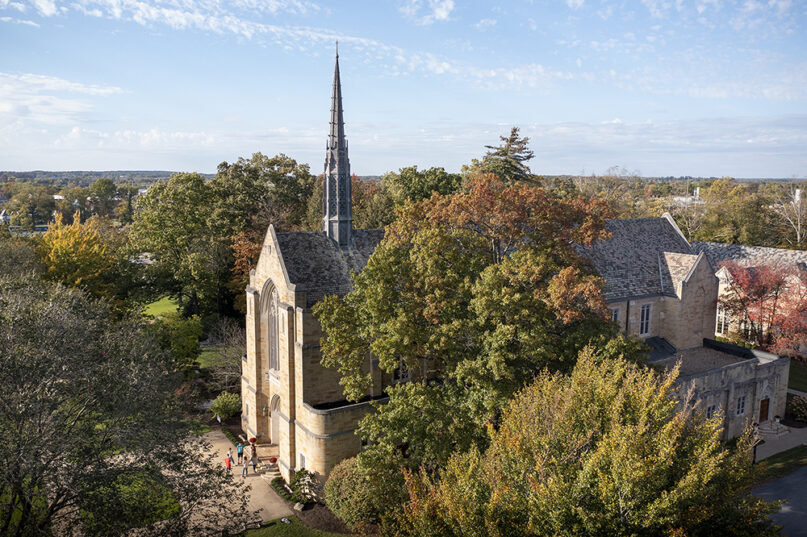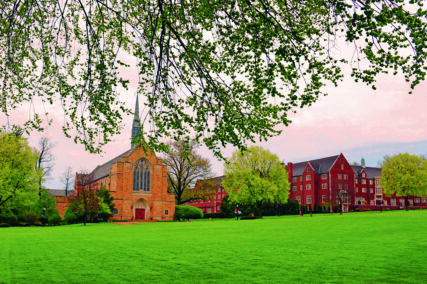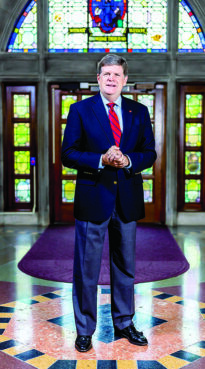(RNS) — A small, conservative Christian college in Pennsylvania has become the latest battleground in the evangelical “woke war.”
Since 2020, concerns about “wokeness” — a term used for those aware of systemic racism and, recently, often connected to critical race theory — have pitted Christians against one another in the pews and in the classroom. Grove City College, nestled in the quiet borough of Grove City an hour north of Pittsburgh, Pennsylvania, has been a prime example.
On Feb. 16, the college’s board of trustees stated that it “categorically rejects Critical Race Theory and similar ‘critical’ schools of thought as antithetical to GCC’s mission and values.” This week, in response, a petition from Grove City alumni, parents and students asked the school not to inhibit discussions about race and racism on campus.
The board’s decision and the dissenting petition follow months of debate over whether Grove City College has succumbed to “mission-drift” from its traditional values.
The controversy began last fall, when a group of parents and alumni authored a petition raising concerns that critical race theory, an academic framework that sees racism as embedded in institutions and policies, was “threatening the academic and spiritual foundations that make the school distinctly Christian.”
The authors of the Nov. 10 petition, titled “Save GCC from CRT,” called the theory a “destructive and profoundly unbiblical worldview” that sees white people as “intrinsically racist” in a society that “favors Whites and oppresses Blacks and other minorities.” This, they said, undermines the Christian understanding that humans “equally share the image of God.”
RELATED: Woke war: How social justice and CRT became heresy for evangelicals
“What’s happening at Grove City is what’s happening within the conservative movement in America,” said John Fea, professor of American history at Messiah College in Mechanicsburg, Pennsylvania. Fea told Religion News Service that debates over wokeness and CRT are dividing theologically orthodox evangelicals into two camps: a “Trumpian” wing that sees CRT as antithetical to the gospel, and a “free inquiry” wing that believes CRT can be utilized as a tool for understanding racial justice.
At Grove City College, where just 6% of undergraduates are “multi-ethnic,” according to the website, the board reaffirmed its commitment to “free society, traditional values, and the common good” in its Feb. 16 rejection of critical race theory. The statement also introduced a new committee that will investigate allegations of mission-drift and identify remedial actions that have already taken place or ought to be implemented. Some of the school’s stakeholders, however, fear that the board’s statement could curb free thought on campus, as they made clear in a new petition published Tuesday evening (March 8).
“In discussions with faculty, we have become aware that some faculty may be limiting their course content to avoid allegations of teaching CRT,” the petition says. “We ask that the board make a strong commitment to academic freedom and not ban whole theories or perspectives.” As of Friday morning, the petition had 134 signatures.
Natalie Kahler, a Grove City alumna (’94) who authored the March 8 petition, identifies as a “very conservative” Republican who wants to see the school preserve its strong commitment to academic freedom. “To me, the whole point of an academic education at the collegiate level is to teach kids how to think, how to process information and how to hear debates and figure out where you land on them,” she told Religion News Service.
The earlier November petition against CRT received 478 signatures from students, parents and alumni. The petition cited as evidence of CRT “asserting itself at GCC” a fall 2020 chapel presentation by Jemar Tisby, a historian and author who writes on race and religion; a chapel that included a pre-recorded TED talk by Bryan Stevenson, an Equal Justice Initiative founder and criminal justice reform advocate; a Resident Assistant training that included the concepts of white privilege and white guilt; and several books used in an education studies class and in focus groups, including Ibram X. Kendi’s “How to be an Antiracist” and Wheaton professor Esau McCaulley’s “Reading While Black.”
“As biblically grounded Christians, we are not defensive about racism,” the November petition said. “Where it exists, we should repent of it. We are concerned, though, when our students are falsely convicted and unbiblically indicted simply because of their skin color.” The authors of the petition did not respond to Religion News Service in time to be included in this story.
President Paul McNulty addressed the initial petition in a Nov. 18 letter. In it, he also wrote that Grove City does not accept “critical theory” as a “proper framework for examining and understanding the real challenges faced in our fallen world today.”
Since then, the CRT debate has only gained traction. The authors of the November petition responded that they were unsatisfied with the president’s letter, and in the following months, Grove City faculty and administrators publicly defended the institution.
In February, an unknown number of faculty published an anonymous letter also expressing concern that some instances of how CRT was being taught at the school illustrated “misalignment between their approach and the historic mission and identity of the College.”
The letter, which called for an investigation of the concerns raised in the November petition and of Grove City’s handling of the petition, said McNulty and his leadership team had “tarnished the College’s status as a trusted conservative alternative” and “eroded commitment and goodwill among the College’s core constituency.”
On Feb. 16, the board issued its rejection of critical race theory. Two days later, 50 faculty members signed a letter, published in Grove City’s student paper, denouncing the earlier anonymous letter, saying it “does not speak for the faculty at large” and was “full of misunderstandings, half-truths and statements made without evidence.”
Warren Throckmorton, a professor of psychology who signed the second faculty letter, told Religion News Service that some faculty are unsure how to respond to the board’s rejection of critical race theory since it doesn’t offer a definition of CRT. “Are we talking about the CRT that is misused in social media, where it is referring to anything that anybody talks about related to race? Or is it the actual social science theory, or the actual legal theory of CRT?” he asked.
When asked whether the board’s statement was effectively a ban on critical race theory, McNulty told Religion News Service that the statement was an extension of the school’s mission, vision and values and that the new committee, the majority of whom are current board members, will provide guidance for next steps.
“I think that the board has an opportunity in this effort to try to provide more definition for the college in how we want to manifest this missionally aligned academic freedom going forward,” he said. The president added that the review would also help determine how Grove City will navigate conversations around race and racism in the future.
Grove City isn’t the only Christian college to get caught in the crossfire. Concordia University Wisconsin, a Lutheran school and member of the Council of Christian Colleges and Universities, suspended a professor in February after he accused the school of being “under the influence of Woke-ism” for seeking a new president committed to diversity, equity and inclusion. In October, faculty at Cornerstone University, a CCCU school in Grand Rapids, Michigan, voted no confidence in their school’s incoming president, in part for his alleged opposition to diversity, equity and inclusion efforts.
According to Fea, Christian liberal arts colleges throughout the U.S. are in a time of testing.
“There’s a certain fearlessness that a true Christian liberal arts college must have, not to be afraid of ideas, or of what the press or political pundits try to define as boogeymen, or of thinking critically about those things,” said Fea. “I think Grove City is a testing ground for this. And from what I’ve seen and heard on the ground, despite the criticism, they are doing a decent job at addressing the attacks from the right.”
RELATED: Cornerstone University votes no-confidence in president the day before inauguration







